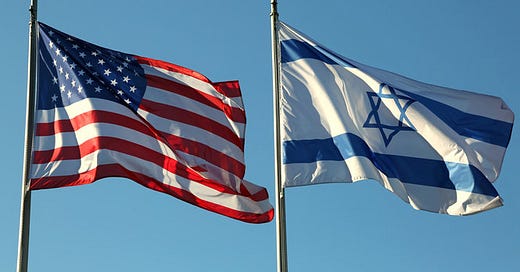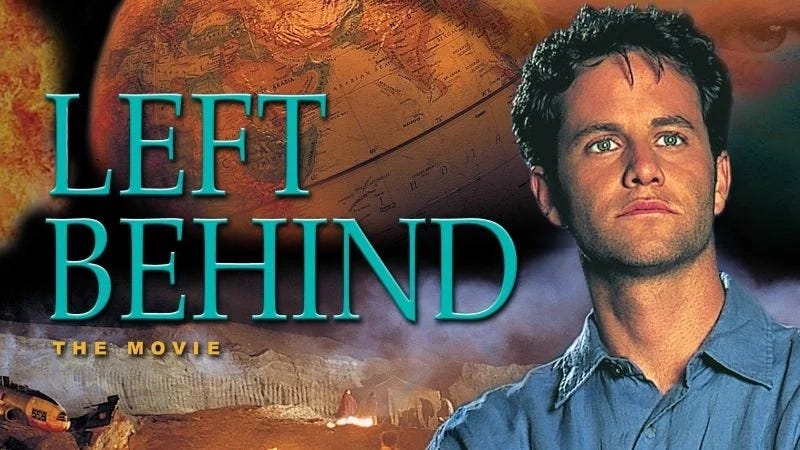Christian Zionism: What is it and how did it come to be?
A brief explainer of the ideology and it's history.
The flags of the United States and Israel flying side by side. Israel relies on Christian Zionists for most, if not all, of its support in the United States.
Before October 7th, I had never heard of the label, Christian Zionism. Being the curious cat that I am, I turned to Google and was shocked to realize that it was something quite familiar to me. Being raised in a fundamentalist Evangelical Christian family had it’s own set of quirks. For example, Sunday school for high school students was almost entirely a class on the history of the modern State of Israel (as it is called by Christians) and how it ties into the prophesies found in the Books of Daniel and Revelation. To everyone else, Christian Zionism is a political ideology but to me, I remember it as Church.
What is Christian Zionism?
Christian Zionism is an ideology among Evangelical Christians in the return of the Jewish people to the Holy Land of Palestine and they believe this return is a prerequisite for the Second Coming of Christ. They also believe that the founding of the State of Israel is in accordance with Biblical prophecy from both the Old and New Testaments. In short, Christian Zionism is Christian support for the settler-colonial project of Israel.
It is estimated that there’s anywhere from 30 million to 50 million Christian Zionists in the United States alone. Most of which are located in the Bible belt. According to the Jewish Virtual Library, a prominent Jewish Zionist organization, Christians are “driven to support Israel because they wish to repay the debt of gratitude to the Jewish people for providing Christ and the other fundamentals of their faith, and to support a political ally,”. The reality is far more sinister.
Where did Christian Zionism Come From?
Christian Zionism can trace its roots to the Protestant Reformation. It is so intertwined with Protestantism that one could argue that Christian Zionism started the minute that Martin Luther tacked his 95 Thesis to that church door in Wittenburg, Germany. In fact, some of the earliest written examples of Christian Zionist concepts can be found in Luther’s writings. He didn’t believe that in the return of the Jewish people to the land of Palestine. Instead, he thought they would convert to Christianity and saw the Church, specifically the Lutheran Church, as a metaphorical Israel.
The other forefather of Christian Zionism was John Calvin,1 founder of Calvinism, who is probably most famous for his doctrine of Predestination. This belief held that God had already determined who would be condemned to Hell and who would be saved before the creation of the world. How would you know if you were one of the chosen? According to Calvin, it was largely based on your parents. If your parents were one of the Faithful then so were you.
Calvin’s influence is still seen in our lives today. Manifest Destiny can be directly traced back to the doctrine of Predestination. John Locke, an English philosopher who heavily influenced the Declaration of Independence and the American Constitution, was a staunch Calvinist. Locke wasn’t the only the only Enlightenment thinker to have Christian Zionist views. Isaac Newton held extreme views that we would recognize as Christian Zionism. In researching for this piece, I found that every prominent historical figure from the 17th to the 19th century in the western world (and especially in the United States) held early Christian Zionist views.
Joseph Fiennes (Voldermort’s brother) as Martin Luther nailing the 95 Thesis on the door of the Wittenburg Church in the movie, Luther (2003)
How did Christian Zionism come to the United States?
Christian Zionism came over on the Mayflower. That is not a metaphor, a turn of phrase, or a bit of prose to illustrate a point but a literal, historical explanation. Puritans were an extreme branch of Calvinists2 and proto-Zionism (the earliest form of Christian Zionism) was a strongly held belief. As we are reminded every Thanksgiving, the Puritans landed on Plymouth Rock, settled in what we now know as Massachusetts, and is considered by the American public education system to be the founding of America.
While Evangelical Protestantism was born in Europe, it thrived in the United States. With it’s birth, a new wave of Christian Zionism emerged. By this point, there was a significant element that we recognize today. Millennialism, as this doctrine is known, holds that at some point in the future, Jesus will return to earth to usher in a Golden Age before the Day of Judgement, destruction of the world, and the relocation of the Faithful to Heaven3. While the Rapture is just one part of the doctrine of Millennialism, it has become the colloquial term for the entire doctrine.
Millennialism is a foundational doctrine of Evangelical Protestantism and by the early 19th Century explicitly Christian Zionist beliefs were found as part of day to day Christian life. Charles Wesley, one of the founders of the Methodist church, wrote a hymn dedicated to the “restoration” of the Jewish people to the land of Palestine while the concept was added to church liturgies.
During this time, another core doctrine to modern Christian Zionism emerged when John Nelson Darby established his doctrine of Dispensationalism4. This doctrine is a narrative or interpretive framework for understanding the overall flow of the Bible. It requires it’s proponents to use a literal interpretation of Christian scriptures and believes that divine revelation is revealed throughout the Bible.5
In 1840, Darby gave a series of 11 lectures in Geneva, Switzerland that were immediately published into English, French, German, and Dutch. These published lectures because a must read pamphlet and a global sensation. Meanwhile in the United States, the Scofield Bible spread Dispensationalism throughout the American population although by this time, several Christian Zionist lobbying organizations had already formed prior to it’s publication6.
Darby’s Dispensationalism doctrine was expressed at the Niagara Bible Conference in 1878; which issued a 14 point proclamation that relied on several New Testament passages including
“that the Lord Jesus will come in person to introduce the millennial age, when Israel shall be restored to their own land, and the earth shall be full of the knowledge of the Lord; and that this personal and premillennial advent is the blessed hope set before us in the Gospel for which we should be constantly looking”
This marks the beginning of the Modern Christian Zionist movement as we know it today.
Millenialism and Dispensationalism were depicted in the regrettably popular Left Behind books and later the movie adaptations (seen here).
In Conclusion…
Christian Zionism has permeated throughout every aspect of Western ideology. It's been a part of our collective consciousness since before white supremacy even began. The boundaries between it and Christianity are non-existent. Even our understanding of human rights and liberties have been influenced by it. No institution has escaped it’s reach. John Cotton, one of those buckle-headed pilgrims and one of the earliest presidents of Harvard University, published early Christian Zionist works. The same can be said of the founders of Yale.
This is why you see leaders refusing to listen to their constituents and why they are terrified of the People when they call for a Free Palestine. We are not just shaking the foundation of the Western World, we are destabilizing it’s ideology on a subatomic level. The awakening we are seeing isn’t just the Empire of America beginning it’s collapse, but the end of Western ideology since the Age of Enlightenment.
Rest in piss, John Calvin. You know what you did.
Calvinists, as you might imagine from my previous explanation, were already an extreme branch of Protestantism. Puritans were extreme even by Calvinist standards.
This doctrine is the source for the sense of urgency among Christians toward the colonization of Palestine as well as their blind support of the settler-colonial State of Israel.
Dispensationalism is a foundational doctrine to the modern Evangelical Church that we see today.
Dispensationalism builds off of a variant of Millennialism but adds that there is a distinction between the Church and Israel. This belief also holds that Christians are not bound by the Mosaic law (which is the basis for Judaism) found in the Old Testament. This doctrine is most popular with Baptists, Pentecostal, Charismatic, and non-denominational fundamentalist churches.
Because of this, these lobbying organizations do not adhere to Dispensationalism. This is a source of tension within the Christian Zionism that still continues today.






